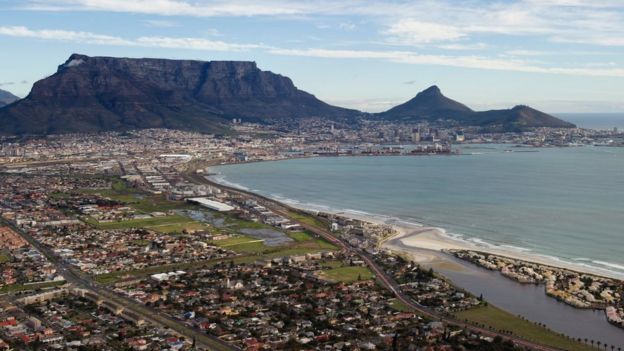How far would you go to save water?
Well, for the head of a provincial government in South Africa, it seems there is no sacrifice too big.
Western Cape Premier Helen Zille has revealed that she showers only every third day.
But it seems that what may appear at first to be a drastic, move is, in fact, a noble one.
And her reason? The Western Cape - famed for its winelands, mountains and beaches - has been experiencing severe water shortages which have worsened in the last year because of a drought in the region.
"I shower briefly‚ once every three days‚ and for the rest wash in the hand basin. I used to wash my hair every day‚ but now only when I shower‚ with visibly negative consequences," Ms Zille wrote in a column.
"However‚ I regard oily hair in a drought to be as much of a status symbol as a dusty car."
Still, Ms Zille, the founder of South Africa's opposition Democratic Alliance (DA), has shocked many with the revelations of her showering schedule.




Ms Zille is no stranger to controversy. She caused a storm recently after posting a tweet in which she suggested there were some positive aspects of colonialism.
Of course, for some South Africans, sacrificing your shower time might seem to be a middle-class problem.
Those living in Cape Town's informal settlements have to rely on a communal tap for water and bath out of a basin, while low-income households would usually have running water in the house and a bath.
This latest statement, however, has some thinking that her take on water preservation is admirable.

So how did we end up knowing about the hygiene habits of one of South Africa's best-known politicians?
Well, Ms Zille was rebuffing a recent article by TimesLive which raised questions about the provincial department's use of tax-payers' money to install a water purification system at her official residence in Cape Town.
Desperate to show that she takes the water crisis seriously, she said: "As for my husband and I‚ we try to use so little water‚ that I sometimes get worried about the hygienic and aesthetic consequences."
The news might have provided some light relief on social media but for residents of the province, the water shortages are no laughing matter.
The average water level of dams across the Western Cape is 35%‚ a significant drop from the 61% at the same time last year, according to the province's water affairs department.

As a result, what is known as "level five restrictions" on water use are now in place - with each of its six million residents allowed to use no more than 87 litres a day.
The average eight-minute shower uses 62 litres, according to a 2011 study - 70% of each person's daily allowance.
Those who use too much face the possibility of a fine, with harsher measures brought in against certain businesses.
But water use is difficult to keep tabs on, and so residents have been implored to "self-police".
It doesn't appear to be working.
Authorities say residents and businesses simply haven't been doing enough to adhere to the new rules.
The province is now looking at investing in alternative methods of water supply, including recycling and extraction of groundwater.
Latest Stories
-
CFAO partners with Lovol to power Ghana’s heavy equipment market
11 minutes -
‘I don’t know what you call rich’ – Bryan Acheampong on support for Wontumi’s GH¢50m bail
20 minutes -
Dr. Who? Ghana’s Epidemic of Degrees without Diagnosis: Satirical Musings on Ghana’s Curious Obsession with Titles
24 minutes -
Glaucoma Laser treatment launched at St. Thomas Eye Hospital
36 minutes -
Hindsight: What does the law say about Nations FC’s walk-off?
38 minutes -
Mahama outlines the bold vision behind establishment of the GoldBod
42 minutes -
Highway robbers make off with over 1.7 million CFA, jewellery, and phones at Gomoa Potsin
43 minutes -
Put Ghana first: Asantehene tells Mahama appointees during courtesy call
49 minutes -
Why Otto Addo should maintain these players in the Black Stars going forward
51 minutes -
Ghana Voice Actors Community officially launched in Accra
1 hour -
Dr Sodzi Sodzi-Tettey honoured with Doctor of Science Degree by UHAS for contributions to health and leadership
1 hour -
UHAS-Nkabom Project: A $9.8m vision to transform public health, tackle unemployment, and end malnutrition
2 hours -
TGS brings health and financial hope to Ngalekyi fishing community
2 hours -
Prof Zottor urges journalists to lead public nutrition awareness in Volta and Oti regions
2 hours -
Karpowership champions reliable, inclusive power solutions for industrial growth
2 hours

